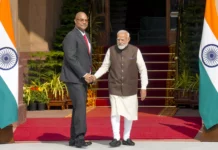 NEW DELHI: The Supreme Court today sought response from the Centre on Kargil martyr Capt Saurabh Kalia’s father’s plea seeking its direction to the government for raising the case of his son’s torture at the hands of Pakistan Army at the International Court of Justice.
NEW DELHI: The Supreme Court today sought response from the Centre on Kargil martyr Capt Saurabh Kalia’s father’s plea seeking its direction to the government for raising the case of his son’s torture at the hands of Pakistan Army at the International Court of Justice.
A bench headed by justice R M Lodha issued notice to the Centre and sought response within ten weeks on a petition filed by Captain Kalia’s father, N K Kalia.
The bench, sympathizing with Kalia’s agony, however, said that it would examine whether it can direct the government to raise this issue at the international forum before passing such an order.
It, however, said that the Centre is free to raise the issue on its own before any international forum.
“We fully share your agony. But what is the role of the court? Can we direct India to take up with the International Court of Justice?
“It is the highest court and our orders should be within the four corners of the Constitution. This is an important issue. If the government wants it can take up the issue with the ICJ and there is no need for our interference,” the bench said.
Advocate Arvind K Sharma, however, pleaded that the government should be asked to respond on what actions it has taken during the last 13 years.
The bench then issued notice to Ministry of Defense, Home Affairs and External Affairs and sought their response within 10 weeks.
Earlier on November 27, N K Kalia had moved the apex court seeking its direction to the Government to raise his son’s case at the International Court of Justice at The Hague.
He had alleged that his son Capt Sourav Kalia, posted with the 4 Jat Regiment (Infantry), was captured as a prisoner of war but was killed in a gruesome manner in violation of the Geneva Convention.
Capt Kalia and five other soldiers of his patrolling team were captured alive on May 15, 1999 and kept in captivity where they were tortured and their bodies mutilated. The apex court tagged Kalia’s plea with another petition pertaining to the Shimla Agreement between India and Pakistan, pending with it.
“We know facts of the case but can the court ask the Union of India to take the matter to the ICJ? We tag the case with other matter as it involves question of very wide ramifications, internationally. If direction is needed within the country, then there is no problem.
“Before any order is passed by this court, there should be absolute clarity that we have got the jurisdiction. Being the highest court, we have to pass the order within four corners of the constitution,” it said.
The bench said the issue requires determination of the question of law and first “the extent we can order” has to be determined.
“The question is whether such mandamus can be issued.
There is already a matter pending pertaining to a treaty between Zulfikar Ali Bhutto and Indira Gandhi (Shimla agreement). Can the court issue mandamus in a matter like this? They are covered by a treaty, where consent of both the states is required,” the bench said. -PTI






